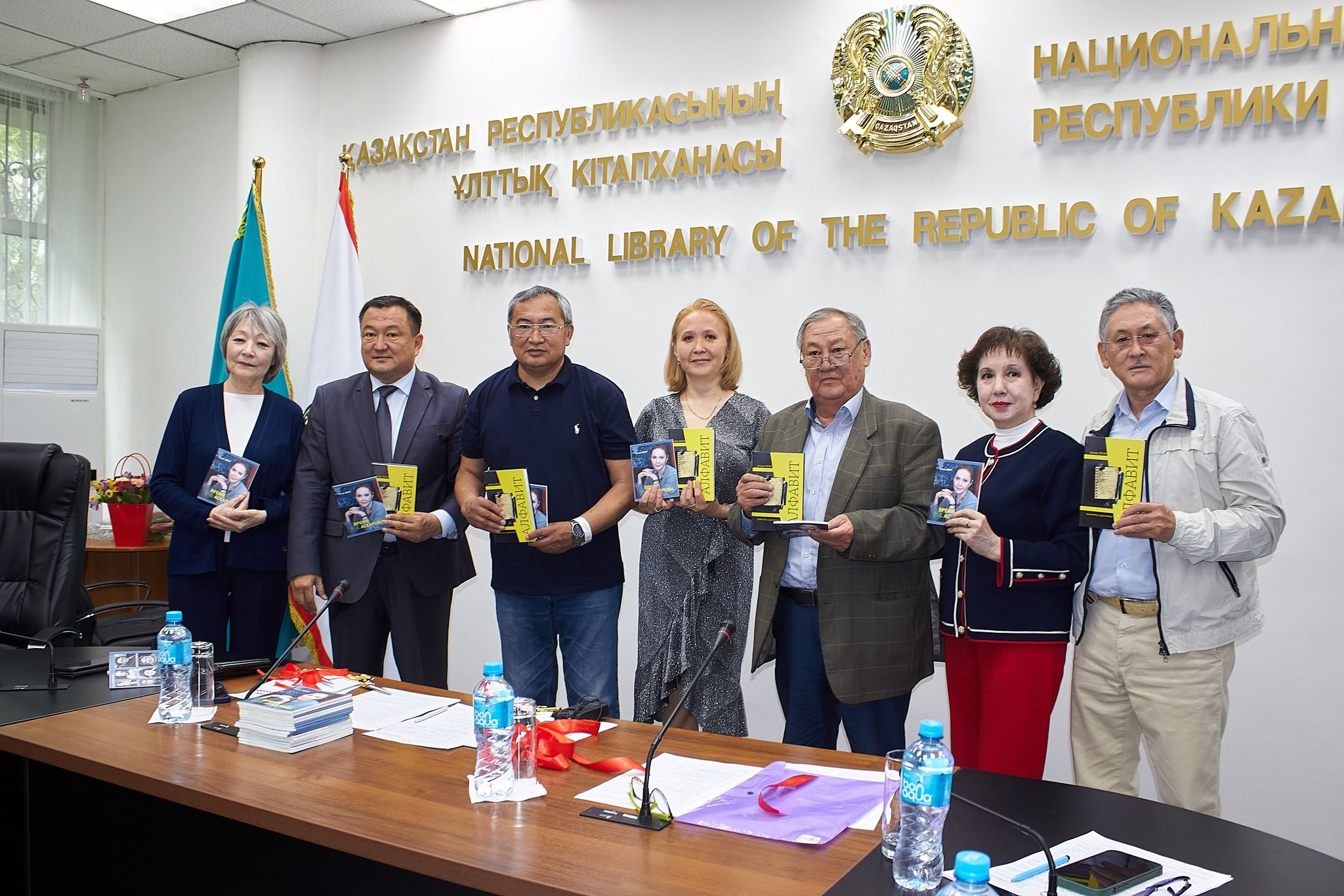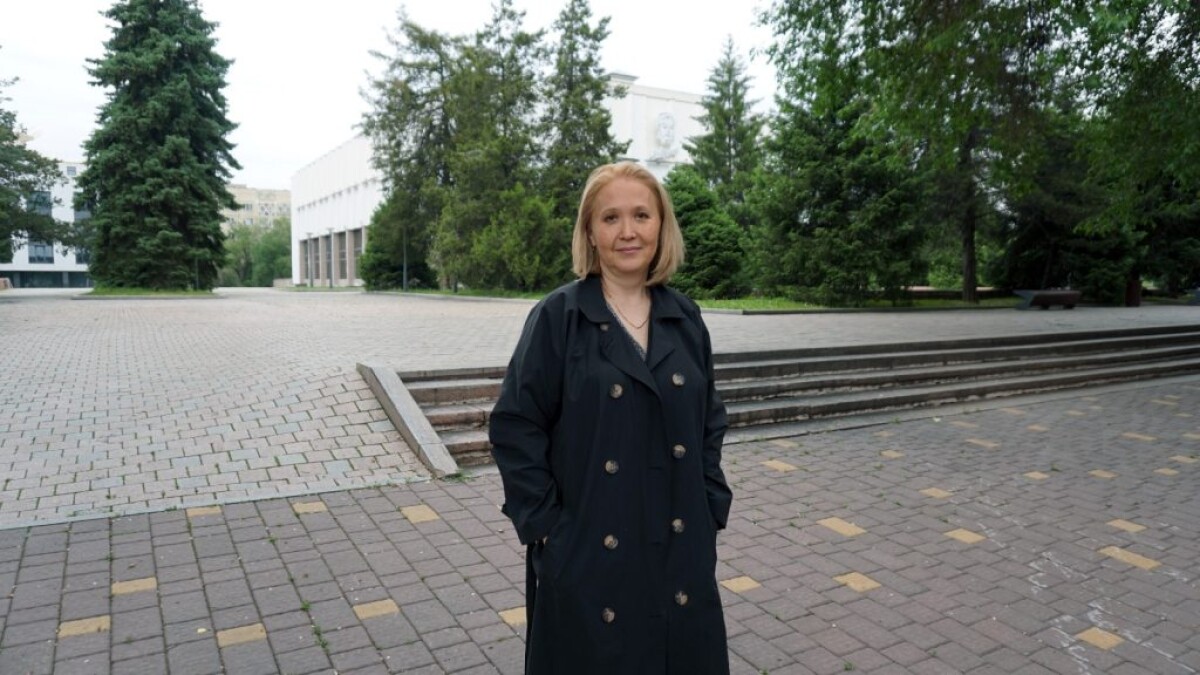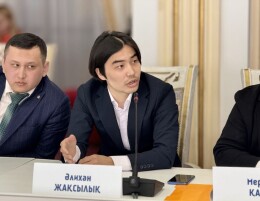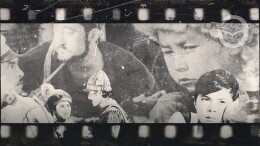The Literary portal managed to interview Asel Omar who shared her current creative and literary activities, choosing her professional path, and many others.
A. Omar is a Kazakh writer, poet, essayist, literary critic and scholar born in the city of Almaty. She published several books of poetry and short fiction including “Credo”, “Early Colds”, “Blue Wolf”, “Tengri Talisman”, “Alphabet” and others. She also wrote movie scripts, literary and theater reviews, philosophical articles, and journalistic materials on politics, culture and art. Her works have been published in Russia, France, Serbia, Montenegro and the U.S. She is a member of the International PEN. Asel graduated from Moscow Literary Institute, completed Higher Courses for Script Writers and Film Directors, and received a Ph.D. from the Peoples’ Friendship University of Russia.
— Asel, greetings! How are you doing? What are you currently up to?
— Hello, Malika! These days, I am working for two future films. One film is based on the novel by a contemporary Kazakh classic Alibek Askar. This is an epic story about a small village and its people. People experienced great historical events from the Second World War, Stalinist repressions in the USSR and until the independence of Kazakhstan. The other film is on my script about Edige, the politician of the 14th century of the Golden Horde, who helps the people to defend justice. He is a man and at the same time a ‘bozkurt’, a character of our culture. Then, Edige has extraordinary powers. In the film, they are reflected using computer graphics. Now I draw costumes and make storyboards for these films. I believe that these films are important today to show the serious human and cultural potential of our country to the world. And cinema provides an excellent opportunity for this.
- You are living in Turkey at the present moment, you also share your impressions and information about the country on your YouTube channel, quite interesting and informative. Could you please tell us, how your stay in this country influenced your writing and, in general, your professional activity as a literary critic?
— Life in Turkey teaches me optimism, even if our life is challenging. People here are very cheerful and rarely complain about life. And, besides, cultural and language similarities help me understand myself as a part of the Turkic world and as a part of humanity, because Turkey as well as Kazakhstan, is the place where the paths of Europe and Asia and many nations go together. I am happy that in Kazakhstan my translation of the poems of a Turkish dramatist and poet, Tarik Gunersel, received the warmest feedback from readers. I am also pleased to be a part of the Anadil Turkce website team. The organizer of the website is Sabri Kuskonmaz, a poet. We have already shared the works of Didar Amantay, Alibek Askar, Oral Arukenova, Alisher Rakhat, Yrysbek Dabey and other authors from the former Soviet Union.
— What is going on in your creative activity? Are you writing any new literary pieces?
— Now I am working on the text “Hadrian’s Gate”, which is an antique arch in the center of Antalya, Turkey. There is also an unfinished text about my life in Vancouver, Canada. You know, it’s interesting when the city is located on many small islands. I think it has something to do with the words of John Donne, “No man is an island entire of itself; every man is a piece of the continent”. Through life in these countries, I hope to reflect on my feelings about what is happening today with us.
- Speaking of the first steps in the profession selected by you, how did you come to literature, and what or who influenced you to choose that path?
— I think it’s my family, where everyone read something interesting, and we could discuss what we had read. My literature school teachers also had a real impact on me. It seemed to me, I didn’t know exactly why writing words, playing with them, making up meanings, understanding the texts of good writers, all these things were so interesting for me. In addition, the letters that both a child and an adult can write, are somehow unconditional and indisputable, unlike words that you can argue with, and words can lie.
- You are active in social networks and have recently launched an informative Book Flashmob, could you in turn tell us about the books you have read this year and what insightful things have been learned from them?
— Those are new books like “Jesus’ Son” by Denis Johnson, “Beetles” by Yrysbek Dabey, “Kulpet” by Sharkhan Kazgulov, stories by Didar Amantay, and “Journey into the World of White Snow and Blue Ice” by Alibek Askar.
And there are books you live always with. You can get back to them whenever you want. For me, it’s “Ulysses” and “Dubliners” by James Joyce, the works of William Faulkner and Jorge Luis Borges. And William Shakespeare. He is like an ocean. They answer the questions we ask today. People say that the best artists are those who can inspire other people to create. For me, these are the authors.
- Taking this opportunity, I would like to ask you about your first book or books at school age, without mentioning childhood and that period’s fairy tales, which are memorable for you and why?
— It seems to me that these are short stories by Anton Chekhov. He knows how to catch the amazing subtleties of the characters and the causes of human behavior. And I really love his sad humor. I think this is a great combination of tragedy and irony. Chekhov’s heroes do not struggle with the horrors that he describes. But at the same time, his irony is a victory over tragedy.
— What are your favorite books, authors? What genre do you prefer? How have your tastes and preferences in literature choice changed, and are changing with time?
— There are many favorite authors. I love any genre, so the list of favorite authors is very diverse. Marcel Proust, Mark Twain, O. Henry, Guy de Maupassant, Thomas Mann (I love everything, from his novel “Buddenbrooks” to short stories). Probably, with age, you begin to perceive more complex literature better. For example, Faulkner in his youth is perceived superficially, at least in his novels.
- You started writing a lot and relatively early, would you tell us about your first works in both prose and poetry?
— My first book “Credo” was published in 1999 in the city of Almaty. It includes poetry and short stories. These were my first more or less professional works. Now I do not like all of them, but they are valuable to me for their frankness and courage.
- Could you share the background and process of writing your short story collection “Alphabet”?
— The stories ‘The Black Snow of December’ and ‘The French Beret’ were published in English, and the poem ‘Don’t Shoot’ was translated by Shelley Fairweather-Vega. In “Alphabet” I tried to answer the question about the values that form a person. Values are the place where you were born, the books you read, and the people you love.

- Could you also comment on the issue of publishing in Kazakhstan, what difficulties do authors face when publishing?
— Those books that are published under the state program need more popularization through the media. This opinion is not only mine but also of other authors. Perhaps, we need a journal in Kazakh and Russian that would publish the works of young, new authors. And there is also a great need for a publication that would cover issues of culture in general, not only literature but also theater, opera, fine arts, and others. Publications about culture are an important part in terms of maintaining communication between readers, publishers, and authors.
- This year you have visited the Eurasian Book Fair in the city of Astana at the EXPO exhibition center, what are your impressions from visiting the exhibition, what trends are found in writing and publishing in Kazakhstan, and its place in comparison with the book market at the international level, stated at the exhibition?
- I liked that new books in most cases quickly find their publisher in Kazakhstan. Even if we do not have as many publishing houses as we would like, some well-known publishing houses such as “Meloman Publishing”, “Foliant”, and “Raritet”, have their own independent editorial policy and publish high-quality literature at a good printing level. I saw that people actively attend meetings with writers, and find information on social networks, and on the Internet. Our people actually read, they are interested in modern Kazakh literature. At the same time, in order for the industry to work better, in my opinion, communication between its participants is needed through special media dedicated to literature and other arts. Abroad, they have a huge and wonderful task of being an intermediary between the reader and the industry, supporting new authors, promoting new books, and drawing readers’ attention with the help of critics to the most worthwhile works.
- Talking about the works of such contemporary Kazakh writers as Alibek Askar, Didar Amantay, and others, how they influenced your works and viewpoint and, in your opinion, the development of Kazakh literature as a whole?
— These two authors are different in style, they belong to different generations. But both Alibek Askar and Didar Amantay are significant authors in terms of the scope of topics and issues raised, and their influence on the literary process. They understand the global world and perceive everything that happens in it as something close, and at the same time, they have a magnetic vision of what is happening in the soul and heart of an individual person, in whom we see ourselves, our loved ones, and our people. We can feel happy having such authors.
- You are a versatile creative personality, and in the past, you also studied at the Department of feature film at the Higher Courses for Scriptwriters and Directors in the workshop of Emil Loteanu, a Moldovan and Soviet film director. Could you tell us about that experience of yours and to what extent it has influenced some aspects of your life?
— I admire the energy and passion that Emil Loteanu had for cinema and the great intelligence it took to make his great films. Knowledge of music, rules of acting, painting, scenography, understanding of dramaturgy, literature, history, and psychology. At the same time, you need a warm, sincere heart that loves this world and people, rejoices and fights with them. And I always remember this.
- What is your life motto in the current time and would like to disclose this theme, as some life principles and attitudes tend to change in connection with our maturation, development and growth?
- As I see it, it is important not to look back at our past, because there are no changes there, but to change our present for a better life and future.
- Is there anything of vital importance, a certain kind of message of yours to the younger generation of writers, poets, and all those involved in literature in Kazakhstan?
- Probably a good message would be to do what you love. Then everything will be fine.
— Thank you very much for your time and interview!
— Thank you!
Cover photo by Didar Salimbayev












